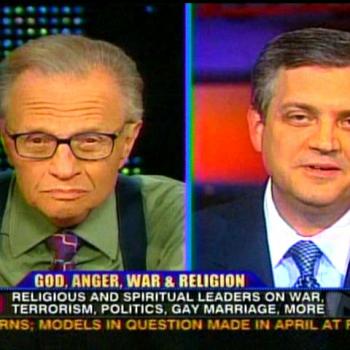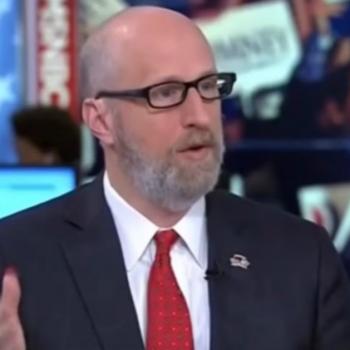If you can believe it, the disagreement between Sohrab Ahmari and David French has gone from the op-ed page and on-line publishing to a road show. Their debate, which first appeared at Catholic University of America, recently played its second exhibition match at the University of Notre Dame — when will the evangelical French get the home field advantage, at Wheaton College, for instance. That second exchange, not exactly the Lincoln-Douglas show down, spurred a number of Christian reflections about a defining aspect of modern society, namely, the reduction of faith from a test for public life to an affair left to individual persons, voluntary associations, and free markets. The separation of church and state is the shorthand for this arrangement, but it goes well beyond politics — Christians don’t believe in priest-doctors (that is, religious authorities who have the power to heal), pastor-lawyers (church officers who have special standing in the courts by virtue of their religious affiliation), or even church-related sports teams (Notre Dame may be Roman Catholic, but to play for or coach the Fighting Irish you don’t need to be in fellowship with the Bishop of Rome; in fact, one of Notre Dame’s greatest coaches, Ara Parseghian was — you guessed it — a Presbyterian). In other words, the religious beliefs and practices of people living in the modern world make little difference for the ordinary and sometimes important (medicine) areas of human existence as people now live them. The separation of church and state was the tip of the iceberg.
Ahmari and French have been debating this under the heading of liberalism. The former thinks liberalism has gone awry by encouraging people to think Drag Queen Reading Hours at public libraries are a good thing. French, in contrast, is still committed to a liberal order and argues the American legal system is the best protection for Christians even if it also allows Drag Queens access to children. (I wonder if a Solomonic solution would be for Drag Queens to read the Bible for children.)
Most of the responses affirm separation of church and state but not a similar division between religion and politics or culture or society or art.
But a lot of the comments also show a basic discomfort with Christianity being just one option among a diverse society of believers, nones, sexually chaste, sexually promiscuous, gun owners, cat lovers, and Mormons (the list really could go on). If faith is not essential to government, medicine, banking, and hitting a baseball, then people from all sorts of outlooks would seem to be capable of participating and sometimes succeeding in modern society. For some the word for success in life is flourishing, though Christians tend to regard it as a virtuous way of life, not making millions of dollars or owning the horse that wins the Triple Crown.
Here are some examples that have emerged after the Notre Dame event. Doug Wilson objected to Draq Queens reading in libraries:
David French is not really trying to do this thing Even Steven. If he were fighting for a closer approximation of a consistent viewpoint neutrality—which is impossible, but we can try, can’t we?—what he would be after is Drag Queen Story Hour on Fridays, and What God Did to Sodom on Mondays. Equal time, in other words. We could ask the Fruity Boys to host the events on Fridays, and some fundamentalists with skinny neckties, pockets full of Chick tracts, with black floppy Bibles, and hailing from Antioch Baptist, to do Bible Story Hour on Mondays. If a librarian can invite one offensive group, then wouldn’t it be viewpoint neutrality for her to be able to invite another different kind of one?
Brian G. Mattson replied:
perhaps French, and those of us in his camp, believes that the American experiment is the greatest political arrangement yet devised for the triumph and flourishing of freedom and virtue, precisely because free virtue is real virtue, organic moral fiber, not outward conformity produced by fiat. Perhaps he knows that virtue is the work of fathers and mothers, gospel ministers, and school founders and teachers, rather than by politicians and lawyers. Perhaps he knows this is a fallen world where we do not have the luxury of a system of unfailing perfection, and that there are always tradeoffs, lamentable as they might be.
Mattson leaves Drag Queens out of his list of virtuous citizens. That may be plausible since these folks may not want to be deemed virtuous. But what do Wilson and Mattson think about those Americans who violate other items on the list of Ten Commandments? People who are religious do not follow the first four commandments uniformly. What is idolatry for Protestants is not so for Roman Catholics. But the kind of “flourishing” that liberalism nurtures also benefits Protestants and Roman Catholics as much as Drag Queens. So wouldn’t it be honest for critics (and even defenders of liberalism) to say that it cultivates the flourishing of good stuff and bad? Wouldn’t it be better to admit that it is a flawed system but the best we can do given the diversity of beliefs and moralities that go with a society that protects individual freedoms? One or two cheers, but neither three nor none.
Some of that subdued cheering was evident in Emma Ayers’ comments on the debate:
Yes, the culture war is utterly exhausting. The fact that children have been made to participate in drag queen readings is a tragedy so weighty that it should break our hearts in two. The number of human beings killed in the womb makes me mourn. Protestants are tired, too. It’s why a great number of us voted for Donald Trump. But we can’t see the Ahmari answer as a good one, even if it makes sense for a Catholic to buy into it.
To her credit, Ayers has turned a defense of liberalism from saying it promotes human flourishing to one that it increases mourning. (Don’t lose your anti-depressant prescription.)
But Emile A. Doak pushed back with you-can’t-separate-politics-and-theology (even if you can state and church):
It’s a familiar stance to us Americans, echoing that infamous “wall of separation” between church and state that is frequently misattributed to the text of the Bill of Rights. But while maintaining this distinction may be attractive in a country of such religious diversity, it’s ultimately an untenable position. Underlying every political decision is a conception of the good. Even the “non-aggression principle,” which the most ardent libertarians like to trot out as the sole arbiter of legitimate state authority, is premised on a moral precept: aggression is bad.
The question is how we determine the conception of the good that will order the public square—and the proper limits of political power in pursuing that good. Politics and theology, properly understood, inevitably point to each other. … Human affairs cannot be neatly divided into “disciplines” of politics and theology; reaching the limits of one leads directly to the other.
Well, actually it sounds like you can’t separate church and state because theology and politics overlap also. In which case, a common good to emerge from Protestant-Roman Catholic deliberation may wind up rendering not only Drag Queens but Muslims as beyond the realm of common good. That is not meant as a scare tactic, as if Christians who insist on the importance of theology for politics are closet theocrats. It is only to specify that finding a common good for multiple religions and then also those who reject religion is going to be really hard. So hard that flourishing is not likely to occur.
To repeat, many Christians push back against liberalism, whether from the right when it comes to personal morality or the left when it comes to social justice, for not letting religion have a chance to remedy society’s ailments. Larry Lin quoted Leslie Newbigin to support this argument:
To call men and women into discipleship of Jesus Christ is and must always be central in the life of the Church. But we must be clear about what discipleship will mean. It cannot mean that one accepts the lordship of Christ as governing personal and domestic life, and the life of the Church, while another sovereignty is acknowledged for the public life of society. It cannot mean that the Church is seen as a voluntary society of individuals who have decided to follow Jesus in their personal lives, a society which does not challenge the assumptions which govern the worlds of politics, economics, education, and culture. The model for all Christian discipleship is given once and for all in the ministry of Jesus. His ministry entailed the calling of individual men and women to personal and costly discipleship, but at the same time it challenged the principalities and powers, the ruler of this world, and the cross was the price paid for that challenge. Christian discipleship today cannot mean less than that.
I don’t know how Newbigin or Lin would argue the case of Drag Queen Reading Hour, but it seems hard to believe that Jesus would encourage the little ones to attend a reading hour led by men dressed flamboyantly as women.












